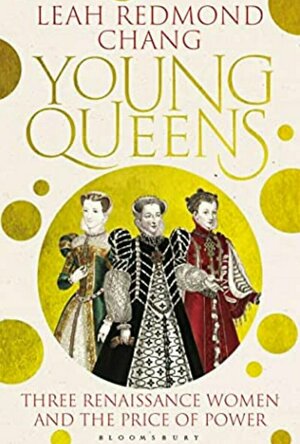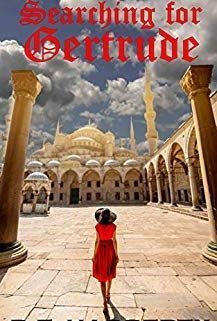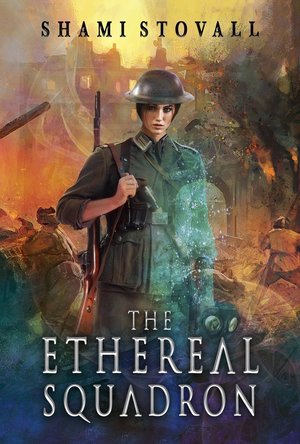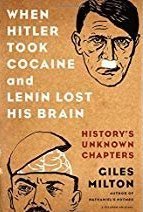Search

Hidden Masterpiece (Soli Hansen Mysteries #3)
Book
In this riveting third book in the Soli Hansen Mysteries series, a woman’s courage to follow her...
Historical Fiction Mystery Dual Timeline
Merissa (13792 KP) rated Winterian Sky (Ninety Planets) in Books
Nov 6, 2023
WINTERIAN SKY is the first book in the new Ninety Planets science fiction series. In it, we find a planet besieged on two fronts - one is by an incoming attack force, the other is by a virus with no known cure that is decimating the population.
Chesterfield is the lone scientist dedicated to finding a cure. Danacio is a Guard of Winterian, prepared to lay down his life for his planet. Together, these two go on a journey to figure out where the virus originated from and how to cure it. They meet a brilliant couple who have suffered their own losses, just as determined as Chesterfield to find the answers and the cure.
This is a fast-paced book that will keep you turning the pages. All of the characters are well-rounded and I loved how they all worked together, meshing with purpose. As the first book in a new series, there is world-building but also worlds-building. You get an idea of the Alliance and the things they stand for. I can't wait to read more in this series, and I'm seriously hoping for an update on Winterian and how their war is going on.
Love plays a big role in this story - whether it is familial love or romantic. There are moments of closeness between our two MCs but it is closed-door/fade-to-black which worked perfectly in this story.
A great read that I thoroughly enjoyed and I can't wait to return to the Ninety Planets!
** same worded review will appear elsewhere **
* A copy of this book was provided to me with no requirements for a review. I voluntarily read this book; the comments here are my honest opinion. *
Merissa
Archaeolibrarian - I Dig Good Books!
Nov 6, 2023
Chesterfield is the lone scientist dedicated to finding a cure. Danacio is a Guard of Winterian, prepared to lay down his life for his planet. Together, these two go on a journey to figure out where the virus originated from and how to cure it. They meet a brilliant couple who have suffered their own losses, just as determined as Chesterfield to find the answers and the cure.
This is a fast-paced book that will keep you turning the pages. All of the characters are well-rounded and I loved how they all worked together, meshing with purpose. As the first book in a new series, there is world-building but also worlds-building. You get an idea of the Alliance and the things they stand for. I can't wait to read more in this series, and I'm seriously hoping for an update on Winterian and how their war is going on.
Love plays a big role in this story - whether it is familial love or romantic. There are moments of closeness between our two MCs but it is closed-door/fade-to-black which worked perfectly in this story.
A great read that I thoroughly enjoyed and I can't wait to return to the Ninety Planets!
** same worded review will appear elsewhere **
* A copy of this book was provided to me with no requirements for a review. I voluntarily read this book; the comments here are my honest opinion. *
Merissa
Archaeolibrarian - I Dig Good Books!
Nov 6, 2023

The Captain's Pet (Alien Slave Masters #1)
Book
When a distant planet’s ownership is in dispute, conquering aliens turn defiant human males into...
Science Fiction MM Erotic Romance BDSM

Angel 6.0: Concubine (Angel 6.0 #1)
Book
My name is Angel, and I live on Nugene Station. My days are filled with doctor's tests, but I spend...
Science Fiction Erotica

Young Queens: Three Renaissance Women and the Price of Power
Book
Sixteenth-century Europe: Renaissance masters paint the ceilings of Florentine churches, kings...
Non-fiction France Spain Scotland England 16th Century Europe
Kara Skinner (332 KP) rated The Remnants in Books
Sep 10, 2019
Genre: Historical Fiction
Average Goodreads Rating: 4.26/5 stars
My rating: 3/5 stars
Danny Pulbrook is a handsome and rebellious young man. Born the bastard son of a minor royal and orphaned at birth he is determined to find a new life far beyond his “pre-ordained oblivion”. His only way out – a forced enlistment into the army brings him to an inevitable confrontation with his own demons in the cauldron of the first world war.
Rose Quayle is a beautiful and confident hazel-eyed housemaid who, like her mother and her mother’s mother is employed in service at Meaford House – an expansive vice-regal estate near Tunbridge Wells. Like Danny she longs for a life beyond the tyranny of the rigid class system that defines her humble destiny.
Their chance meeting becomes the catalyst that changes both of their lives forever.
The Remnants is like a fixer upper. It’s unpolished and a bit of a hot mess, but you can still see the potential. Unfortunately, The Remnants was published before it got the TLC it deserved.
Not only is the text plagued with typos and missing punctuation, but there are too many storylines and character to keep straight. It’s a hot mess that could have been amazing.
The story starts out on a seemingly inconsequential day, with two minor characters talking. Yes, minor. They’re barely in the story but they make up the opening scene that eventually introduces Rose as a young, innocent girl going on her first car ride. So far there’s promise. After all, the boggy description will clear up when the story gets going, right?
I wish.
But it does pick up when we meet lovable bad boy Danny. Straight from an orphanage and now working at a general store, he’s a troublemaker and has never known love of any sort. He’s convinced he’s unlovable. Perfect for a love interest. I do have a thing for the bad boys. Give them a vulnerable side and I’m practically putty.
Rose and Danny have an excellently sweet and innocent chance encounter that clashes with the darkness in the rest of the book. Actually, there’s no foreshadowing at all that things will go so horribly awry when they met, or how dark most of the book is.
But dark it is. Danny goes off to fight in India, leaving Rose behind, but promising to still see her. After realizing he will die unless he deserts the army, he runs away and Rose goes to live with him in Canada
Had this been split into two or three full-length novels with the first novel ending here, I would have liked it a lot. But instead this great beginning with Danny’s and Rose’s innocence isn’t given the full detail and development it deserves, instead being condensed to the beginning of the novel.
But unfortunately it gets worse. Because the story continues. With so many characters that it’s impossible to keep them straight.
Danny’s character takes a sharp left when he feels the need to go to war again, this time with the Canadian army. He and Rose had practically just found each other and now he’s going back to fight, and after he had almost died the last time? Yeah. That makes total sense. What is he, an addict all of a sudden?
The entire story goes in a whirlwind. Danny has such a steep character arc, from innocent teenaged boy to hardened veteran, it might as well be a character cliff. Rose, on the other hand, doesn’t have that much character to arc. She’s slightly more bitter by the end, but she had already been bitter in the beginning of the story. Her lack of character frustrates me to no end.
There are some good parts to this story, though. Rose’s experience in the workplace was well-written, as was the death of Grace, Danny’s girl on the side. His war buddy, Mitch, is an excellent character and funny as hell, even if he is a bit cliched. The dynamic between Danny and his comrades is actually very good and I wish I had seen more of that and less flowery description about the war atmosphere.
While this story is mildly entertaining, well-researched, and interesting, it’s not my favorite and I will definitely not be reading it again. What do you think? Does this book sound interesting to you?
Average Goodreads Rating: 4.26/5 stars
My rating: 3/5 stars
Danny Pulbrook is a handsome and rebellious young man. Born the bastard son of a minor royal and orphaned at birth he is determined to find a new life far beyond his “pre-ordained oblivion”. His only way out – a forced enlistment into the army brings him to an inevitable confrontation with his own demons in the cauldron of the first world war.
Rose Quayle is a beautiful and confident hazel-eyed housemaid who, like her mother and her mother’s mother is employed in service at Meaford House – an expansive vice-regal estate near Tunbridge Wells. Like Danny she longs for a life beyond the tyranny of the rigid class system that defines her humble destiny.
Their chance meeting becomes the catalyst that changes both of their lives forever.
The Remnants is like a fixer upper. It’s unpolished and a bit of a hot mess, but you can still see the potential. Unfortunately, The Remnants was published before it got the TLC it deserved.
Not only is the text plagued with typos and missing punctuation, but there are too many storylines and character to keep straight. It’s a hot mess that could have been amazing.
The story starts out on a seemingly inconsequential day, with two minor characters talking. Yes, minor. They’re barely in the story but they make up the opening scene that eventually introduces Rose as a young, innocent girl going on her first car ride. So far there’s promise. After all, the boggy description will clear up when the story gets going, right?
I wish.
But it does pick up when we meet lovable bad boy Danny. Straight from an orphanage and now working at a general store, he’s a troublemaker and has never known love of any sort. He’s convinced he’s unlovable. Perfect for a love interest. I do have a thing for the bad boys. Give them a vulnerable side and I’m practically putty.
Rose and Danny have an excellently sweet and innocent chance encounter that clashes with the darkness in the rest of the book. Actually, there’s no foreshadowing at all that things will go so horribly awry when they met, or how dark most of the book is.
But dark it is. Danny goes off to fight in India, leaving Rose behind, but promising to still see her. After realizing he will die unless he deserts the army, he runs away and Rose goes to live with him in Canada
Had this been split into two or three full-length novels with the first novel ending here, I would have liked it a lot. But instead this great beginning with Danny’s and Rose’s innocence isn’t given the full detail and development it deserves, instead being condensed to the beginning of the novel.
But unfortunately it gets worse. Because the story continues. With so many characters that it’s impossible to keep them straight.
Danny’s character takes a sharp left when he feels the need to go to war again, this time with the Canadian army. He and Rose had practically just found each other and now he’s going back to fight, and after he had almost died the last time? Yeah. That makes total sense. What is he, an addict all of a sudden?
The entire story goes in a whirlwind. Danny has such a steep character arc, from innocent teenaged boy to hardened veteran, it might as well be a character cliff. Rose, on the other hand, doesn’t have that much character to arc. She’s slightly more bitter by the end, but she had already been bitter in the beginning of the story. Her lack of character frustrates me to no end.
There are some good parts to this story, though. Rose’s experience in the workplace was well-written, as was the death of Grace, Danny’s girl on the side. His war buddy, Mitch, is an excellent character and funny as hell, even if he is a bit cliched. The dynamic between Danny and his comrades is actually very good and I wish I had seen more of that and less flowery description about the war atmosphere.
While this story is mildly entertaining, well-researched, and interesting, it’s not my favorite and I will definitely not be reading it again. What do you think? Does this book sound interesting to you?
Lindsay (1796 KP) rated Searching For Gertrude in Books
Apr 9, 2019
Searching for Gertrude take you on a hunt to find a girl of a young man love. Will he find this true love he lost. The young man is German and he has some issues with his government.
We learn about the laws that are going down in Germany at the beginning of Hitler Resign. The Nazi believed that Germans were not allowed to marry Jews. Will Rulfoff find this love or will Rudolf get his answers by searching for the girl he fell in love with when he was young. Things to go down hill when his love of his life family must move away to Turkey. He is determined to find her.
He goes undercover for his government even though he does not follow or like this government laws and ideas. As a German consulate there are a few surprises along the way will he go against or follow this government as he is now working for them. Find out by reading.
Rosalyn is an American Jew who come to Turkey to be a Nanny. Rudolf stumbles upon her in his search for Gertrude and ask her for help. Does she help him or not you will need to read the story to know for sure.
Rosalyn come to Turkey for her own reason as well. There is twist and turns throughout the book. Will Rosalyn do as she came to do in Turkey. The author does a wonderful job with the plot. I could not put it down and the fact, that she shows the time and era and history behind what going on in Turkey. Is Turkey with Nazi or they Nurteral during the War. If you are a historical fiction reader or just like learn some facts about history. This book is a good one to pick up. Want to learn more about Germany or Nazi Germany and other surrounding areas or Turkey in the 1930’s.
We learn about the laws that are going down in Germany at the beginning of Hitler Resign. The Nazi believed that Germans were not allowed to marry Jews. Will Rulfoff find this love or will Rudolf get his answers by searching for the girl he fell in love with when he was young. Things to go down hill when his love of his life family must move away to Turkey. He is determined to find her.
He goes undercover for his government even though he does not follow or like this government laws and ideas. As a German consulate there are a few surprises along the way will he go against or follow this government as he is now working for them. Find out by reading.
Rosalyn is an American Jew who come to Turkey to be a Nanny. Rudolf stumbles upon her in his search for Gertrude and ask her for help. Does she help him or not you will need to read the story to know for sure.
Rosalyn come to Turkey for her own reason as well. There is twist and turns throughout the book. Will Rosalyn do as she came to do in Turkey. The author does a wonderful job with the plot. I could not put it down and the fact, that she shows the time and era and history behind what going on in Turkey. Is Turkey with Nazi or they Nurteral during the War. If you are a historical fiction reader or just like learn some facts about history. This book is a good one to pick up. Want to learn more about Germany or Nazi Germany and other surrounding areas or Turkey in the 1930’s.
Merissa (13792 KP) rated The Ethereal Squadron (The Sorcerers of Verdun) in Books
May 8, 2019
The Ethereal Squadron (The Sorcerers of Verdun) by Shami Stovall
The Ethereal Squadron is part of The Sorcerers of Verdun series, and it starts off with a bang! To put it very simply - sorcerers exist, and they are fighting in WWI. Now, if you're a history buff, just be prepared for this story to be different to the books you may have read prior to this. This is, after all, a fiction book. Saying that though, the realism that is portrayed by this author is second to none. From situations to characters, they all have the ring of truth going on, which just kept on improving my satisfaction of this story.
I won't go into the story, you don't need me to do that. What I will tell you is this story is exceptional in EVERY way. From the research done into battles, guns, chains-of-command, to how characters react in situations. When these characters fall from a great height, they are worried about how much it's going to hurt! They don't just blithely jump, not fearing consequences. The character development is outstanding. All of the characters change during this book, in a way consistent with them. No one suddenly become Superman after being Clark Kent for 99% of the book!
I thoroughly enjoyed this story, and definitely want to read more. One of the things I enjoyed most was the 'time'. All too often, stories are set in the second World War. This made the story individual, and coupled with the rest of the elements in here, I would even go so far as to say unique.
A long book without a single wasted word. Absolutely recommended by me, and I can't wait to read more - both about these Sorcerers, and also from this amazing author.
* A copy of this book was provided to me with no requirements for a review. I voluntarily read this book, and the comments here are my honest opinion. *
Merissa
Archaeolibrarian - I Dig Good Books
I won't go into the story, you don't need me to do that. What I will tell you is this story is exceptional in EVERY way. From the research done into battles, guns, chains-of-command, to how characters react in situations. When these characters fall from a great height, they are worried about how much it's going to hurt! They don't just blithely jump, not fearing consequences. The character development is outstanding. All of the characters change during this book, in a way consistent with them. No one suddenly become Superman after being Clark Kent for 99% of the book!
I thoroughly enjoyed this story, and definitely want to read more. One of the things I enjoyed most was the 'time'. All too often, stories are set in the second World War. This made the story individual, and coupled with the rest of the elements in here, I would even go so far as to say unique.
A long book without a single wasted word. Absolutely recommended by me, and I can't wait to read more - both about these Sorcerers, and also from this amazing author.
* A copy of this book was provided to me with no requirements for a review. I voluntarily read this book, and the comments here are my honest opinion. *
Merissa
Archaeolibrarian - I Dig Good Books
ClareR (6091 KP) rated The Parisian in Books
May 30, 2019
Compelling historical fiction
Midhat Kamal arrives in Montpellier in 1914 to study at the University to become a doctor. He falls in love with his University professor landlords daughter, Jeanette, but he becomes disillusioned with the family, and leaves to continue studying in Paris. He lives here during the war, and becomes friends with other Arabic men during a tumultuous time in the Middle East.
When Midhat returns home to Nablus, he is expected to conform to his fathers wishes, marry a woman from a good Muslim family, and work for the family business. He is thereafter known as The Parisian to those who don’t really know him, because of his style of dress and his outlook on life.
Politics soon begin to affect every part of his life, as the colonial powers of Britain and France flex their muscles. Their unwillingness to learn histories and the way people actually want to live cause untold problems, which actually we still see the consequences of today.
I can see that some may struggle with the French and Arabic peppered through the dialogue (I don’t speak Arabic), but I do think it was used in such a way that I didn’t lose track of what was happening, and it lent some credibility to the story. Midhat slips in french words to his speech when something surprises him, or he feels strongly about something. His second language has become a part of him. Endearments are usually in Arabic as well (it took a little while for me to realise what they were, and there are other words used that aren’t just endearments, I’m sure!).
This is a beautifully told story. It’s hard to read in places - history isn’t always very pretty. But I think it’s important to learn about the past in order to understand the present and hopefully learn from past mistakes.
Many thanks to NetGalley and the publisher for my copy of this book to read and honestly review.
When Midhat returns home to Nablus, he is expected to conform to his fathers wishes, marry a woman from a good Muslim family, and work for the family business. He is thereafter known as The Parisian to those who don’t really know him, because of his style of dress and his outlook on life.
Politics soon begin to affect every part of his life, as the colonial powers of Britain and France flex their muscles. Their unwillingness to learn histories and the way people actually want to live cause untold problems, which actually we still see the consequences of today.
I can see that some may struggle with the French and Arabic peppered through the dialogue (I don’t speak Arabic), but I do think it was used in such a way that I didn’t lose track of what was happening, and it lent some credibility to the story. Midhat slips in french words to his speech when something surprises him, or he feels strongly about something. His second language has become a part of him. Endearments are usually in Arabic as well (it took a little while for me to realise what they were, and there are other words used that aren’t just endearments, I’m sure!).
This is a beautifully told story. It’s hard to read in places - history isn’t always very pretty. But I think it’s important to learn about the past in order to understand the present and hopefully learn from past mistakes.
Many thanks to NetGalley and the publisher for my copy of this book to read and honestly review.
BookblogbyCari (345 KP) rated When Hitler Took Cocaine and Lenin Lost His Brain in Books
Aug 14, 2018
Book Review by Cari Mayhew.
If only all events in history could be taught this way! This is his hands down one of the most entertaining history books you’ll ever read! The book is composed of 50 chapters depicting from lesser known points in history. The stories are dramatic, compelling, and often shocking. There are tales of heroism, injustice, conspiracy and cannibalism.
Each chapter is it's own little, well written, real-life story. And each is rounded off with a profound sentence or two to summarise. I gained an appreciation of the role of pigeons and dogs in the war, I learned why the Dodo bird became extinct, and I discovered that it’s possible to survive 2 nuclear bombs.
Normally with non-fiction book with so many isolated sections, I'd be tempted to skip sections, but that was not the case this time - I enjoyed every single one! I’ve noticed there are more books in the series, and I intend to read them all!
The best way to convey how well written the stories are, is to leave you with an excerpt:
“There was a sickening crunch and a violent jerk. The right wing of the plane was ripped off by the mountain peak and flung backwards into the rear of the fuselage. The plane, wildly out of control, smashed into a second peak, which tore off the left wing.
Inside the cabin, the terrified passengers expected the shattered plane to plunge them to their deaths. But the plane’s crash-landing miraculously spared some of those on board. The fuselage hit a snow-covered mountain slope and slid downwards before coming to a halt in a deep drift.
As a wall of silence descended over the wreckage, the injured and groaning survivors came to their senses. They were lost in the wilds of the High Andes. But they were alive!”
For more of my reviews, check out www.bookblogbycari.com
If only all events in history could be taught this way! This is his hands down one of the most entertaining history books you’ll ever read! The book is composed of 50 chapters depicting from lesser known points in history. The stories are dramatic, compelling, and often shocking. There are tales of heroism, injustice, conspiracy and cannibalism.
Each chapter is it's own little, well written, real-life story. And each is rounded off with a profound sentence or two to summarise. I gained an appreciation of the role of pigeons and dogs in the war, I learned why the Dodo bird became extinct, and I discovered that it’s possible to survive 2 nuclear bombs.
Normally with non-fiction book with so many isolated sections, I'd be tempted to skip sections, but that was not the case this time - I enjoyed every single one! I’ve noticed there are more books in the series, and I intend to read them all!
The best way to convey how well written the stories are, is to leave you with an excerpt:
“There was a sickening crunch and a violent jerk. The right wing of the plane was ripped off by the mountain peak and flung backwards into the rear of the fuselage. The plane, wildly out of control, smashed into a second peak, which tore off the left wing.
Inside the cabin, the terrified passengers expected the shattered plane to plunge them to their deaths. But the plane’s crash-landing miraculously spared some of those on board. The fuselage hit a snow-covered mountain slope and slid downwards before coming to a halt in a deep drift.
As a wall of silence descended over the wreckage, the injured and groaning survivors came to their senses. They were lost in the wilds of the High Andes. But they were alive!”
For more of my reviews, check out www.bookblogbycari.com





